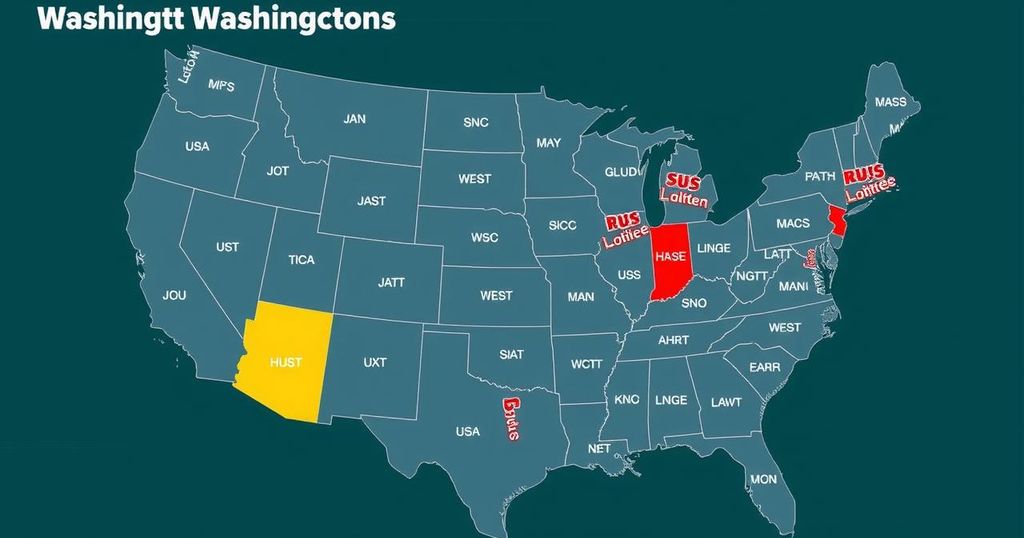As Election Day approaches, Washington voters are fixated on the presidential race between Kamala Harris and Donald Trump, overshadowing local races including a new governor and other key positions. Interviews reveal significant anxiety regarding the election’s outcome, as constituents express concern over Trump’s return to power. The dynamic local campaigns are adapting to this overwhelming focus on national narratives, putting pressure on candidates to engage voters with relevant messages. Early voting statistics reflect a downturn in turnout compared to previous elections, underlining the pervasive anxiety among the electorate regarding their choices.
As Election Day approaches, voters in Washington State are primarily fixated on the presidential race between Vice President Kamala Harris and former President Donald Trump, overshadowing local contests and initiatives. This election marks a significant pivotal moment, as Washington will select a new governor, attorney general, public lands commissioner, and several congressional representatives. Interviews with residents reveal a sense of existential dread surrounding the potential implications of a Trump outcome. Many express that while local races are crucial, the national narrative capturing attention is eclipsing them. Voter David Phillips highlighted the overwhelming nature of the presidential race, stating, “It really crowds out everybody’s attention span for all of the smaller stuff, which is probably more directly impactful on my life.” His concerns mirror those of other constituents reacting to the rhetoric and actions attributed to former President Trump, which some find alarming. Local candidates have adapted their strategies accordingly. Democratic gubernatorial candidate Bob Ferguson positions his rival Republican Dave Reichert alongside Trump in his campaign ads to tap into the overwhelming sentiment regarding the presidential election. The dynamics play out significantly in suburban areas, traditionally seen as battlegrounds, which have trended Democratic amid Trump’s rise. Notably, sentiments are varied; some voters remain critical of both presidential candidates yet feel compelled to participate in the electoral process, viewing it as a civic responsibility. Voter Sandy Robinson articulated her dilemma, voting for Harris as a perceived lesser evil amidst her concerns about crime and economic challenges. In contrast, Chuck Lysen expressed deep discontent with Trump’s character and approach, emphasizing that the personal qualities of the candidates greatly influence his voting decision. Amidst these discussions, individuals involved in the electoral process, such as Mike Kenna, a ballot printer, voice concerns over the integrity of elections being undermined by rhetoric claiming widespread fraud, particularly from Trump’s camp. His sentiments resonate with others who witness the erosion of trust in foundational democratic processes. As the election nears, early voting statistics depict a lower turnout compared to the 2020 election cycle while illustrating a divide in voter engagement across demographics. As of the latest reports, the anxiety surrounding the upcoming election is palpable, as voters navigate their choices framed largely by the national political landscape.
In Washington State, the impending gubernatorial election and various other local races coincide with a heightened focus on the presidential election, where Harris and Trump stand as candidates. This year marks the first gubernatorial election in twelve years, alongside critical positions such as the attorney general and public lands commissioner. Voter concern about the potential implications of the presidential election, particularly regarding Trump’s return to power, overshadows local races, which traditionally hold significant importance.
The upcoming elections in Washington reflect a broader national preoccupation, primarily concentrated on the presidential race, while simultaneously grappling with local initiatives and races. Voter anxiety pervades discussions, with many prioritizing the implications of leadership at the national level over state and local candidates. This sentiment may affect overall voter engagement and turnout, highlighting an urgent need for local candidates to connect their messaging to voter priorities.
Original Source: www.seattletimes.com






